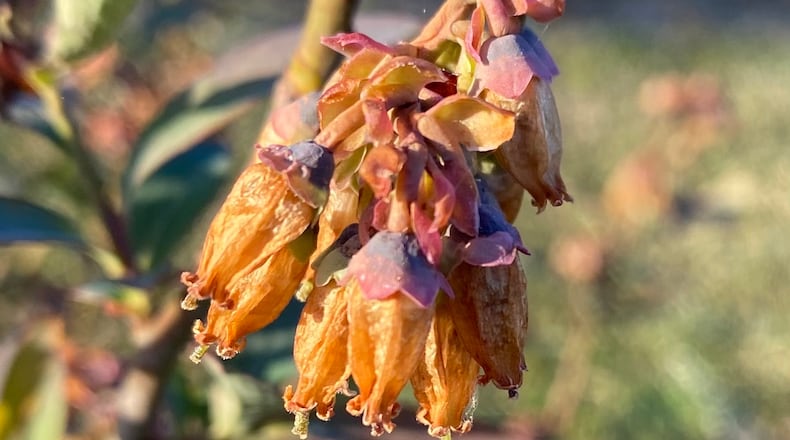The blueberry fields on Hector Buitrago’s Greensboro farm were a sea of white blooms earlier this month.
Encouraged by the warm, spring-like temperatures, his bushes were dotted with thousands of delicate flowers ready to bear fruit, he said. It was a welcome sight, after freezing temperatures in early April last year claimed most of his and other producers’ crop.
But his excitement over the potential of a successful harvest quickly turned to angst last week when forecasts began calling for temperatures across much of the state to dip into the teens and 20s.
Credit: Hector Buitrago
Credit: Hector Buitrago
Buitrago said he and his wife, who together have run HEMI Blueberry Farm since 2015, spent days preparing. They bought heaters and commercial blowers. They spread torches and drums for burning wood across the four acres where they grow blueberries.
When the sun rose the next morning, he said, it was obvious their efforts had failed.
“We had no luck,” Buitrago said. “All the flowers were damaged and killed by the morning. They were totally brown.”
His farm, unfortunately, was not the only one hit hard.
Zilfina Rubio, an assistant professor and small fruit extension specialist in the University of Georgia’s horticulture department, said it will take days or even weeks to fully assess the extent of the damage from last week’s cold temperatures.
The freeze could be a significant blow to Georgia’s agricultural economy. Rankings vary from year to year, but lately Georgia has been among the top four blueberry-producing states in the country. In 2020, Georgia’s blueberry crop was worth more than $300 million, making it the state’s most valuable fruit or nut crop and its eighth most valuable agricultural commodity overall.
Just over 80 miles southeast, the blooms on Dick Byne’s blueberry bushes near Waynesboro are also shriveled.
Byne said he used sprinklers to coat his plants with a layer of ice ahead of the freeze, a technique that can sometimes ward off frost damage. But temperatures were too cold for it to be effective. He said his entire crop may be lost.
A drop to “20 degrees or 19 degrees ... you just can’t beat it,” he said. “It was too much.”
Farther south in Bacon County, where the bulk of Georgia’s blueberry crop is grown, larger farms also sustained damage, according to Rubio.
Credit: Dick Byne
Credit: Dick Byne
The factors that amplified the impacts of this freeze can be traced back months ago.
Georgia saw exceptionally warm temperatures early this winter. December 2021 was the second-hottest December on record for the state, with temperatures averaging 9.5 degrees above 20th century norms. The temperatures cooled off some in January and February, giving plants the adequate “chill hours” they need to bear fruit. But the early season heat meant that, once warm weather returned several weeks ago, blooms opened and berries were vulnerable.
Pam Knox, an agricultural climatologist at the University of Georgia, said that many varieties grown in the state bloomed almost a month early.
“It’s not that the frost was so late — it’s that the development of the crop was so early because of the warm temperatures this winter,” Knox said.
Forecasters had predicted that Georgia likely would have a warmer than average winter due to a persistent La Niña pattern. The higher temperatures also reflect the influence of human-caused global warming. In the U.S., winters are warming faster than any other season due to climate change, according to a recent analysis by the nonprofit organization Climate Central.
Last week’s freeze also hurt peaches in some parts of the state, but most growers seem to have dodged major losses, according to Dario Chavez, an associate professor in peach research and extension in the University of Georgia’s horticulture department.
Experts say that blueberries seem to be the crop that was most affected, largely due to geography. Most of the state’s blueberries are grown in warmer, southern counties, while peaches and apples are grown mainly in the middle and northern parts of the state.
Back-to-back freeze events in 2017 and 2018 left many blueberry growers reeling. In both events, it’s estimated that 60% or more of the state’s crop was lost.
About the Author
Keep Reading
The Latest
Featured





